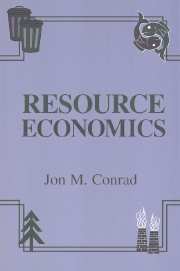Book contents
1 - Basic Concepts
Published online by Cambridge University Press: 05 June 2012
Summary
Renewable, Nonrenewable, and Environmental Resources
Economics might be defined as the study of how society allocates scarce resources. The field of resource economics would then be the study of how society allocates scarce natural resources such as stocks of fish, stands of trees, fresh water, oil, and other naturally occurring resources. A distinction is sometimes made between resource and environmental economics, where the latter field is concerned with the way wastes are disposed of and the resulting quality of air, water, and soil serving as waste receptors. In addition, environmental economics is concerned with the conservation of natural environments and biodiversity.
Natural resources are often categorized as being renewable or nonrenewable. A renewable resource must display a significant rate of growth or renewal on a relevant economic time scale. An economic time scale is a time interval for which planning and management are meaningful. The notion of an economic time scale can make the classification of natural resources a bit tricky. For example, how should we classify a stand of old-growth coast redwood or an aquifer with an insignificant rate of recharge? Whereas the redwood tree is a plant, and can be grown commercially, old-growth redwoods may be 800 to 1,000 years old, and their remaining stands might be more appropriately viewed as a nonrenewable resource. Whereas the water cycle provides precipitation that will replenish lakes and streams, the water contained in an aquifer with little or no recharge might be more economically similar to a pool of oil (a nonrenewable resource) than to a lake or reservoir that receives significant recharge from rain or melting snow.
- Type
- Chapter
- Information
- Resource Economics , pp. 1 - 18Publisher: Cambridge University PressPrint publication year: 1999



